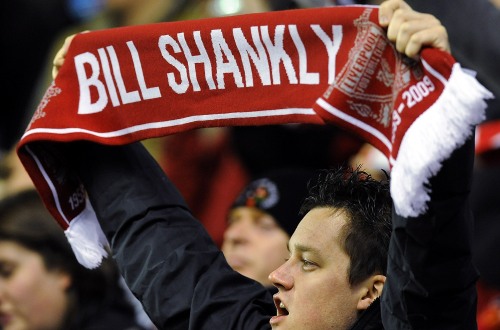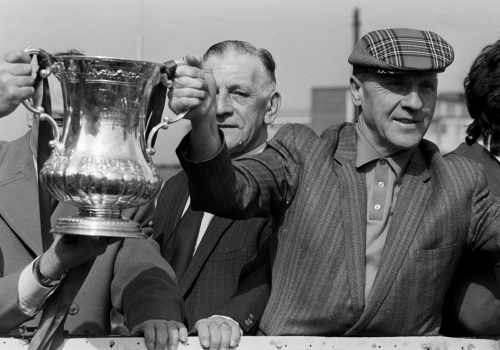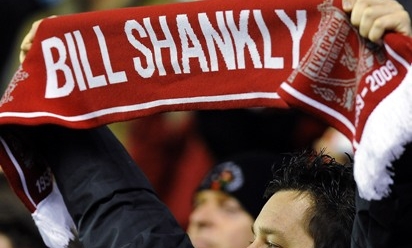Column: Shanks made Anfield a pilgrimage
In the first of two guest posts for Liverpoolfc.com's Talking Reds series to mark our #Shankly100 coverage, James Marsh digs deep to find a greater understanding of what Bill Shankly means to the club.
Midway through the second half of the final game of the 2012-13 season, the Kop took a brief break from serenading the retiring Jamie Carragher, and cries of 'Shankly, Shankly' rang from various sections of the famous old stand.
Four months short of what would have been the great man's 100th birthday, and 32 years since his passing, this isn't such a rare occurrence; you can hear 'the noise from the Bill Shankly boys' most weeks during the season, home or away.
However, on this special occasion, like the slow, complete rendition of 'You'll Never Walk Alone' shortly before the final whistle, this was different. The words were sent drifting on the breeze from the back of the Kop, rather than hurled towards the pitch in encouragement of players, or to make ourselves heard. This was almost funereal.
Bill Shankly's achievements between joining a Second Division LFC from Huddersfield Town in December 1959, through to his retirement in 1974 following his second FA Cup triumph, are well documented.
The accounts of what he was like as a coach and a person, from those who played with and under him, and from fans who followed him at the time, are also plentiful. We know the quotes about the drawing of curtains and anniversary trips to Rochdale reserves, of comparisons with life and death.
I am not qualified to give my version. I was born five years after Shankly passed away, and more than a decade after he led the Reds to their eighth First Division title, and his third and last since gaining promotion in 1962.
However, critically, what younger generations can represent is current proof that his legacy is as strong and as enduring as ever, and that while we may take occasional trips down memory lane, we are also celebrating what we are today, whatever the result on the pitch.

The sequence of names - Shankly, Paisley, Fagan, Dalglish - and their achievements at Anfield, will always stand the test of time, immortalised in iron gates, sculpture and song, and listed in a roll of honours that few clubs can compete with.
It's when you dig a little deeper that you come to a full understanding of what sets apart Liverpudlians' relationship with these men from how fans of other clubs view their most successful managers. It all started with William Shankly OBE, of Glenbuck, Scotland.
Shanks' arrival would come to symbolise the moment Liverpool fans stopped merely admiring their managers, and began worshipping them. As the years went by and trophies rolled in, this became less about coaching decisions such as replacing Brian Hall with John Toshack in a rescheduled UEFA Cup final, but about representing something far more important and transcendent than a proficient leader of a football team.
Reds hung from his every word, just as they hung from lampposts and scaffolding in attempts to get a glimpse of him when the cup final winners returned in '65. Going to Anfield on a Saturday was no longer just an escape from the reality of working-class weeks, but a pilgrimage.
At a time when players truly were the on-pitch representatives of fans, Liverpool's manager was the unanimously elected leader of a people's republic. It wasn't his ability to inspire three points that mattered so much as the way this man from a small mining town with a population of 700 carried the hopes and dreams of a city of thousands, defiant and resilient against the threat of industrial and economic decline within the shadow of the capital, spreading their message country-wide and eventually around Europe.

When thinking of the standing Shanks had among the people, one of the most powerful images comes from that famous clip of a local reporter breaking news to passers-by that Shankly had handed in his resignation in 1974. One long-haired lad, no older than 14, looks authentically shell-shocked, and not in the way someone might be concerned and contemplating how a team would replace a winning manager.
This was the genuine despair of a boy who felt lost without his leader. "Who said...?" were the only words the kid could manage before staring vacantly into space. His silence spoke for the red half of the city. Ian Callaghan, a revelation under Shankly and the man whose appearance record for the club will never be broken, said the city was 'in mourning' and recalled how it was hard to picture the club continuing. Thankfully, things turned out alright in the end.
In 2015, it will be a full 50 years since Shankly returned to Liverpool with his team along with our first-ever FA Cup, marking a day he would always insist was the greatest of them all.
The fresh, first-hand accounts may grow few and far between, but the Scot's legacy must continue, not merely with his name on the gates, but immersed within the culture of our club and its support. As the fan base becomes increasingly global, those of us who remain as attracted to where we are from as to where we are going, must take responsibility to ensure the legend lives on.
Follow the author @Marsh_JC.



